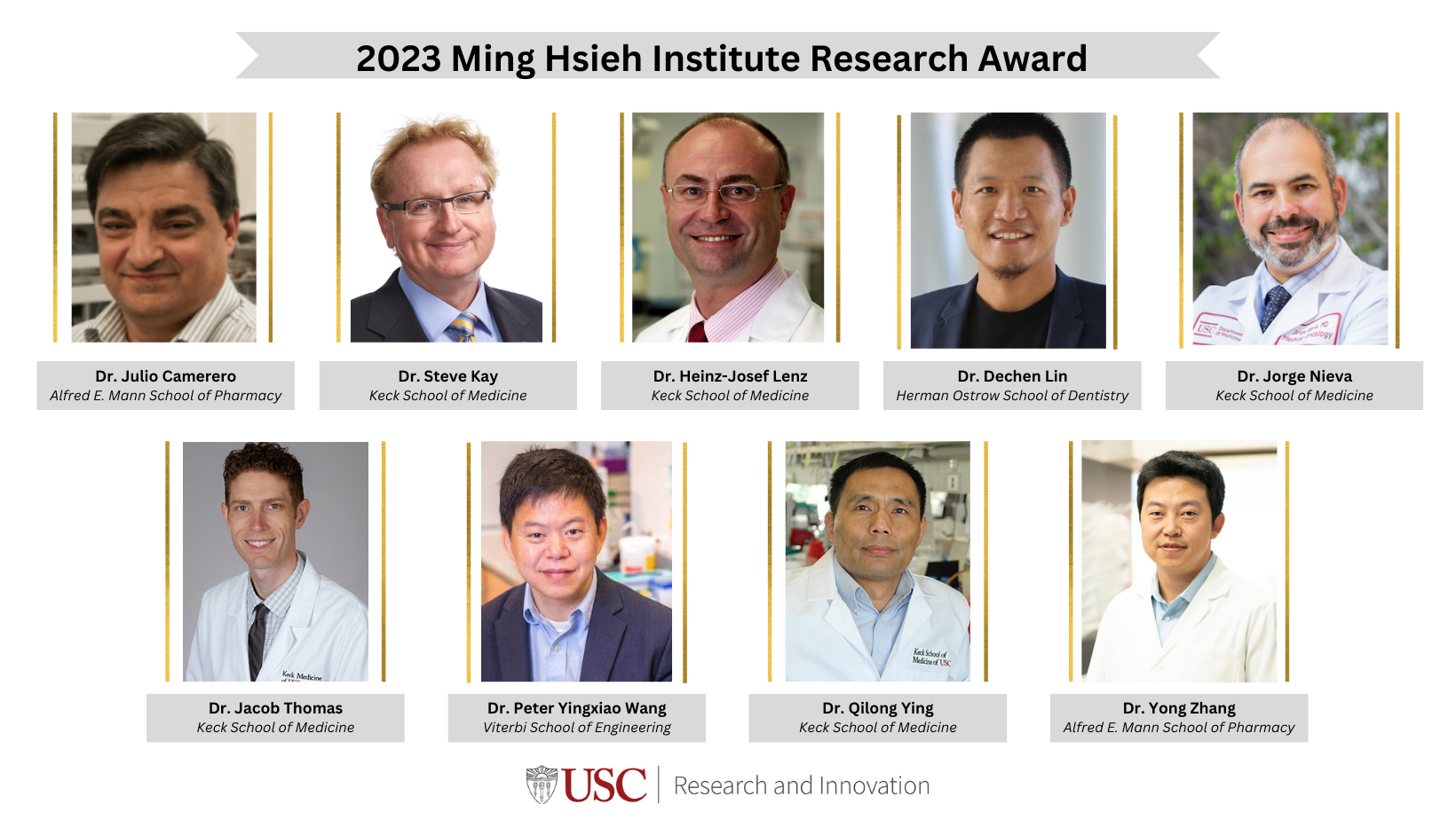The USC Office of Research and Innovation (OORI) has converged with the Ming Hsieh Institute for Research on Engineering-Medicine for Cancer (MHI) to create the Ming Hsieh Institute Research Award, which aims to make USC an international leader in translational research, bridging basic science, engineering, computing, and medicine. The Ming Hsieh Institute Research Award (MHIRA) promotes the integration of engineering, scientific, and medical research that advances novel thinking and the interdisciplinary and collaborative research needed to speed discovery and be translated into human health improvements.
“I am grateful for Dr. Ming Hsieh’s extraordinary philanthropy and steadfast commitment to improving human health,” said Dr. Ishwar K. Puri, senior vice president of USC Research and Innovation. “The Ming Hsieh Institute has been instrumental in bringing USC researchers from multiple disciplines together to conduct transformative research that leads to groundbreaking solutions.”
The MHIRA supports translational and pre-clinical research that drives innovation, bridges science, engineering, computing, pharmaceutical sciences, and medicine, and expedites the bench-to-bedside development of new life-saving devices and therapeutics to detect or treat cancer. The MHIRA Program track strongly encourages awardees to pursue the development of novel devices, technologies, and other discoveries that can be commercialized and show great promise to improve human health. This year’s MHIRA recipients are:
Project: Therapeutic Targeting of Hdm2/HdmX E3 Ligase in CRC
PI: Julio Camerero, Alfred E. Mann School of Pharmacy
Dr. Camerero’s proposal intends to address the lack of preventive strategies, early diagnostic methods, and effective therapies to treat recurrent colorectal tumors by continuing the development of new therapeutic models that can be utilized to address this unmet need.
Project: Targeting Circadian Clock Proteins for Novel Therapeutics to Treat Acute Myeloid Leukemia (AML)
PI: Steve Kay, Keck School of Medicine
Dr. Kay’s proposal aims to 1) preclinically test the novel clock-modulating compounds in AML cells; 2) discover and develop novel ligands directly targeting BMAL1; and 3) gain functional and mechanistic insights into clock-modulating compound action. Successful completion of this project will result in novel small molecules with desired properties and potential for translation into clinical trials, leading to the development of novel therapeutic strategies for AML by targeting circadian clocks.
Project: Pharmacological Targeting of Pyrimidine Pathway to Modulate Response to Checkpoint Inhibition in Metastatic Colorectal Cancer
PI: Heinz-Josef Lenz, Keck School of Medicine
Dr. Lenz’s proposal intends to establish the clinical value of targeting the pyrimidine pathway as an innovative therapeutic approach to enhance immune checkpoint inhibitor efficacy in colorectal cancer and will provide a crucial understanding of the underlying mechanisms.
Project: Development of Genome-guided Immunotherapeutic Strategies for Head Neck Cancer
PI: Dechen Lin, Herman Ostrow School of Dentistry
Dr. Lin’s proposed effort intends to significantly advance our understanding of complex tumor immunology while simultaneously establishing a novel drug target and biomarker to boost the success rate of immunotherapy for head and neck cancer patients.
Project: INTERCEPT: Data Science-Driven Liquid Biopsy in Early Breast Cancer Detection
PI: Jorge Nieva, Keck School of Medicine
Dr. Nieva’s proposal will address specific unmet clinical needs in the early detection of breast cancer (BC) by developing and validating data science-driven liquid biopsy (LBx) technology to maximize patient benefit by bringing together clinical and research experts.
Project: Window Pre-operative Study of Taxane Chemotherapy in Patients with Squamous Cell Carcinoma of the Head and Neck
PI: Jacob Thomas, Keck School of Medicine
Dr. Thomas’ proposal intends to conduct multimodal analyses that will provide clarity regarding the best strategy for novel immunotherapy combinations with taxane chemotherapies in the preoperative setting.
Project: Controllable CAR T Cell Therapy by Focused Ultrasound for Pediatric Glioblastoma
PI: Peter Yingxiao Wang, Viterbi School of Engineering
Dr. Wang’s proposal intends to take a solid tumor immunotherapy approach, which will open new opportunities to integrate engineering with medicine and result in successful translations from fundamental science and engineering to clinical applications.
Title: Innovative Ultrasound-Guided CAR-Macrophages for Safe and Effective Cancer Immunotherapy.
PI: Qilong Ying, Keck School of Medicine
Dr. Ying’s proposal aims to develop ultrasound-guided chimeric antigen receptor Macrophages (CAR-M) for safe and effective cancer immunotherapy. This research aims to integrate engineering with medicine to create successful clinical applications for cancer treatment.
Project: Development of Novel Antibody-Drug Conjugates for Metastatic Breast Cancer
PI: Yong Zhang, Alfred E. Mann School of Pharmacy
Dr. Zhang’s proposal aims to develop proprietary antibody-drug conjugates (ADCs) targeting human SEMA4D to eliminate circulating tumor cells and solid tumors shedding circulating tumor cells. Novel first-in-class therapeutic candidates will be developed for translation into early clinical studies as part of this effort.
“The Ming Hsieh Institute Research Award takes critical strides towards USC’s research goals, as much as it does towards our commercialization efforts for faculty’s research,” said Dr. Steven Moldin, interim associate vice president of USC Research Strategy and Innovation and interim executive director of USC Stevens Center for Innovation.
